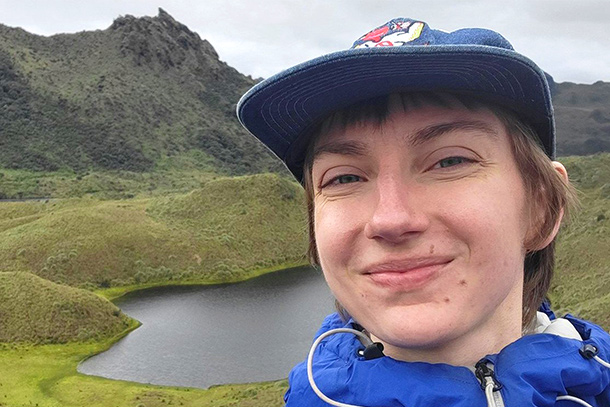
Valerie Smykalov, a dual degree environmental engineering and biogeochemistry graduate student, poses for a photo outdoors. Credit: Courtesy of Valerie Smykalov.
Graduate student earns NSF fellowship to study carbon in river systems
Jult 16, 2025
UNIVERSITY PARK, Pa. — Valerie Smykalov, a doctoral student in environmental engineering in the Penn State College of Engineering and in the Department of Civil and Environmental Engineering dual title biogeochemistry program, was recently awarded a three-year U.S. National Science Foundation (NSF) Graduate Research Fellowship to support her work studying carbon movement through freshwater systems.
The NSF Graduate Research Fellowship Program (GRFP) is among the most prestigious awards for early-career researchers in the United States. It provides recipients with a three-year annual living stipend and a cost-of-education allowance to pursue research-based graduate degrees in science, technology, engineering and mathematics (STEM) fields. Smykalov was one of eight Penn State graduate students to receive the award in 2025.
“This fellowship is incredibly competitive, and I’m not at all surprised that Valerie received it,” said Li Li, the Barry and Shirley Isett Professor of Civil and Environmental Engineering and director of the Biogeochemistry Dual-Title Degree Program, who serves as Smykalov’s adviser. “A few things really made her application stand out. First, she proposed to tackle one of the most critical questions in our field: how climate extremes like droughts and storms affect the carbon cycle. Second, she proposed using global big data and cutting-edge tools, blending novel deep learning methods with traditional process-based models.”
The carbon cycle describes how carbon moves between the atmosphere, land, water and living organisms through natural processes like photosynthesis, respiration, and decomposition. Global carbon budgets track the balance of carbon entering and leaving these systems to help scientists understand and predict changes in Earth’s climate.
Smykalov’s research focuses on river water chemistry and the often-overlooked processes by which carbon travels through groundwater, subsurface systems and rivers — work she said aims to “constrain global carbon budgets in greater detail and discover parts of the carbon cycle that may have been neglected.”
Smykalov earned her bachelor’s degree in geology with a minor in computer science from the University of Illinois at Urbana-Champaign in 2023. As an undergraduate researcher, she studied volcanic eruptions and the temperature at which deep Earth rocks erupted to the surface. Though her focus now lies at Earth’s surface, she said her geology foundation still informs her approach.
“Processes that guide river water chemistry often happen below the surface,” Smykalov said. “My background in geology helps me look kind of beyond what I see in front of me when I look at a river.”
Smykalov also integrates her computational skills into her research, building models to better understand complex natural systems.
Smykalov said the biogeochemistry dual-title graduate program, which is administered by the Department of Ecosystem Science and Management in the College of Agricultural Sciences and the Department of Geosciences in the College of Earth and Mineral Sciences, was a natural fit.
“It’s even in the name — biology, geology and chemistry. That’s exactly what my work demands,” Smykalov said. “When you're studying the movement of carbon through ecosystems and through rivers and the subsurface, you need to understand how rock chemistry and life both contribute.”
In addition to her research, Smykalov mentors an undergraduate student and serves as a member of H3S, an early-career hydrologist organization under the American Geophysical Union. She manages the group’s social media accounts and helps promote grant and research opportunities for fellow students.
Looking ahead, Smykalov said she’s still open to where her career will take her.
“I’d love to do research as a career,” Smykalov said. “I used to think I could solve big problems on my own. But now I understand it’s always a collaborative effort. No one person pushes a field forward alone — you have to work with people, build on others’ work and stay open to learning from them.”

